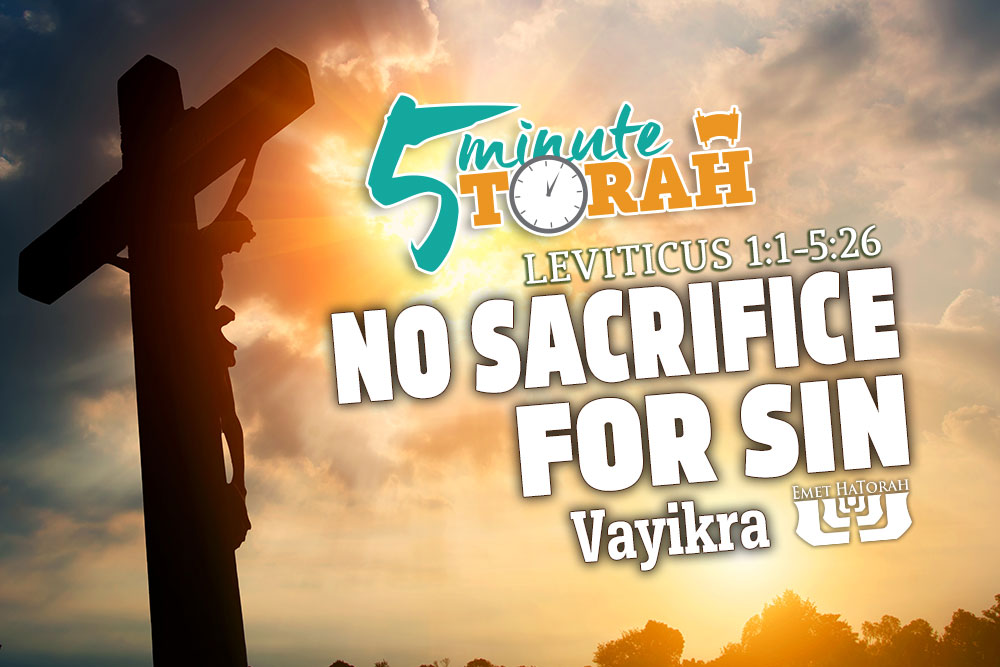Parashat Vayikra - Leviticus 1:1-5:26
Series:

No Sacrifice For Sin
I can’t help but get excited when I begin studying the book of Leviticus. It’s an amazing book that deals with a wide range of topics, but has a primary focus on the levitical functions that take place within the Tabernacle. It wastes no time getting into its subject matter and immediately begins by discussing the details for the olah, or the whole burnt offering. From there it begins explaining the various aspects of each of the types of offerings that a person may bring to the LORD.
To me, this is extremely fascinating. However, I find that most people aren’t as enthused as I am to study the book of Leviticus. They don’t understand what’s going on and are frankly uninterested. But I have come to realize that people don’t understand the biblical sacrificial system for the same reason they misunderstand the death of Yeshua: They look at each as a “get-out-of-jail-free” card. To them, the sacrifices were the old way we could get forgiveness for sinning, and the death of Yeshua is the new way.
But is this really how it works? In the days of the Tabernacle and Temple, could we indulge in sin and then simply get pardoned through the blood of bulls and goats. In our present day and age can we do the same and receive pardon through the blood of Yeshua? First, let’s address the question in the context of the sacrificial system. The first thing we have to realize is that the sacrificial system does not have any kind of provision for intentional sins. All of the offerings that deal with sin are in the context of unintentional sins:
If anyone sins unintentionally in any of the LORD's commandments about things not to be done, and does any one of them …then he shall offer for the sin that he has committed a bull from the herd without blemish to the LORD for a sin offering. (Leviticus 4:2–3)
There is no sacrifice for intentional sins. Why? Because this would lead to an à la carte system by which a person could, in a sense, “purchase” their transgression of choice. How much is lying? A turtledove. What about stealing? A goat. How about if I put my grouchy neighbor out of his misery? An ox. No. God, in His infinite wisdom, foresaw the heart of man and knew that if He were to put a price on intentional sins, then His people would continually be in an immoral tailspin. The Jewish people have always known this. This is why the author of Hebrews is able to say:
For it is impossible for the blood of bulls and goats to take away sins. (Hebrews 10:4)
This statement isn’t referring to a new mans by which atonement was made after the death and resurrection of Yeshua. The author of Hebrews is simply stating a fact. The blood of animals, in and of themselves, has no ability to take away sin. A sacrificial offering is only a means by which a person strengthens his relationship with the Almighty. It is not something that can fix the problem. This is why Yeshua comes to fix the problem. The problem wasn’t in the sacrificial system. The problem was the heart of man:
For if the blood of goats and bulls, and the sprinkling of defiled persons with the ashes of a heifer, sanctify for the purification of the flesh, how much more will the blood of Christ, who through the eternal Spirit offered himself without blemish to God, purify our conscience from dead works to serve the living God. (Hebrews 9:13–14)
In this context, “dead works,” are simply the things we do that separate us from God. Yeshua has the ability that animal sacrifices do not. He has the ability to connect lost souls to his Heavenly Father. But once a person has been connected, Yeshua’s blood cannot be used as a license for sin any more than the blood of the animals brought to the Tabernacle could:
For if we go on sinning deliberately after receiving the knowledge of the truth, there no longer remains a sacrifice for sins, but a fearful expectation of judgment, and a fury of fire that will consume the adversaries. Anyone who has set aside the law of Moses dies without mercy on the evidence of two or three witnesses. How much worse punishment, do you think, will be deserved by the one who has trampled underfoot the Son of God, and has profaned the blood of the covenant by which he was sanctified, and has outraged the Spirit of grace? For we know him who said, “Vengeance is mine; I will repay.” And again, “The Lord will judge his people.” It is a fearful thing to fall into the hands of the living God. (Hebrews 10:26–31)
But doesn’t the Bible say, “the blood of Jesus his Son cleanses us from ALL sin”? Indeed it does, but let’s put it back into context:
If we say we have fellowship with him while we walk in darkness, we lie and do not practice the truth. But if we walk in the light, as he is in the light, we have fellowship with one another, and the blood of Jesus his Son cleanses us from all sin. (1 John 1:6–7)
If we walk in darkness while claiming to be in the light, the blood of Yeshua has no cleansing power over us. But if we walk in the light, as he is in the light, “he is faithful and just to forgive us our sins and to cleanse us from all unrighteousness” (1 John 1:9). Let us therefore not rely upon the blood of either animals nor that of Yeshua to fix our sin problem. But let us rely upon the Spirit of God imparted to us by our beloved Master to transform our hearts and mold us into his image.








